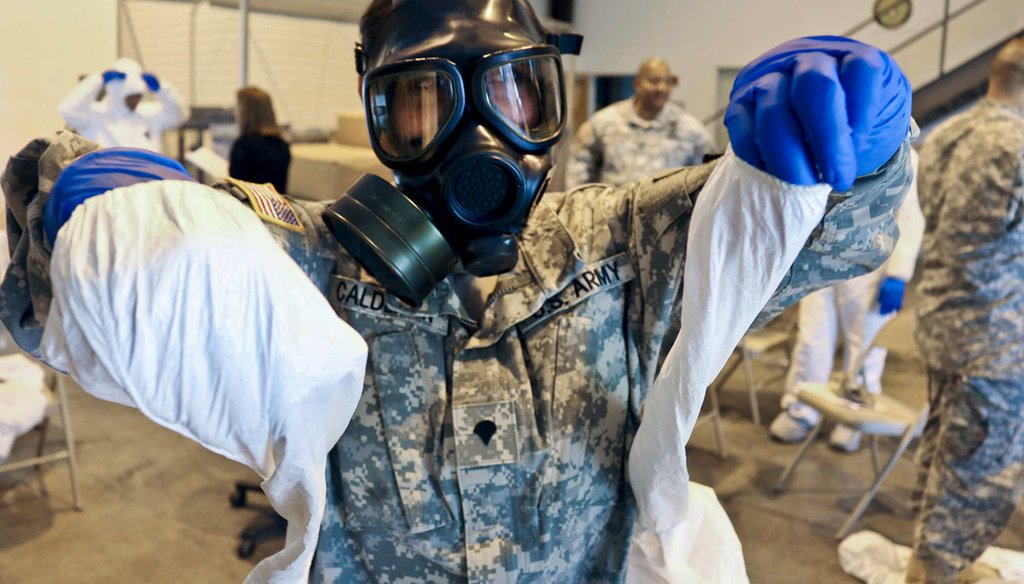Stand up for the facts!
Our only agenda is to publish the truth so you can be an informed participant in democracy.
We need your help.
I would like to contribute

Army Spc. Kristal Calderon practices donning and removing protective equipment and a mask after a class at the logistical warehouse on Fort Gordon, Ga., Oct. 14, 2014.(U.S. Army)
Claims about the Ebola outbreak keep coming, and so do our fact-checks. Here are our five most recent.
Yes, Rand Paul once proposed big CDC cuts
We don’t know yet if the Ebola scare will help either party in the midterm elections, but liberal blogger Doug Muder argued that confronting Ebola shows that it makes sense to vote Democratic. For Muder, Kentucky Republican Sen. Rand Paul is the poster child for a distinct partisan contrast.
"Ebola points out why we need a fully funded government," Muder wrote. "When there’s no immediate threat of disease, government agencies like the CDC look like bureaucratic waste. When Rand Paul put out a ‘Tea Party budget’ in 2011, it included a big cut in the CDC, and virtually no explanation as to how this would affect its mission."
Budget documents confirm that. In 2011, Paul proposed trimming CDC spending by about $1.2 billion, a 20 percent cut.
We rate the claim True.
Ebola vaccine funding has been cut
Democratic strategist Stephanie Cutter claimed recently that funding toward creating an Ebola vaccine was cut in half.
"In fact, money towards the Ebola vaccine is basically cut in half to what it was," she said. "More cuts are coming under the congressional sequester."
That’s true if you compare 2010 to the 2014 estimate, when vaccine research spending fell $37 million to $17.2 million, but not if you use other parameters.
Her claim rates Mostly True.
Soldiers aren’t getting just 4 hours of Ebola training
Former U.S. Rep. Allen West, R-Fla., decried the poor preparation soldiers heading to West Africa are receiving.
"Un-frigging-believable," West tweeted. "U.S. troops are getting only 4 hours of Ebola training before deployment to Liberia."
While the average service member sent to West Africa will receive that amount of training specific to Ebola, the Army says that is a small part of the total training to attune soldiers to medical hazards and to practice the measures to minimize the risk of exposure.
Also, most soldiers are unlikely to be exposed to the virus at all. Their primary job is to train other health care workers.
Soldiers who have a higher risk of exposure are receiving additional training, Army officials said.
The claim rates Mostly False.
Ebola hasn’t spread beyond one country’s border before
Pediatrician and health care television personality Corey Hebert noted a difference in this particular Ebola outbreak during a recent appearance on MSNBC.
"We've had 27 outbreaks around the globe and they've never spread outside of the confines of the countries that were initially affected," Hebert said. "So, it's not something that we have to worry about like in the movie Outbreak. It's not like that."
On the numbers, Hebert is a bit high. A more accurate figure would be between 16 and 22. However, he is correct in his main point, that past efforts have successfully contained the disease.
No previous outbreak -- the first occurring in 1976 -- spread outside the country where it started.
This claim rates Mostly True.
Talk show host Tavis Smiley tried to tamp down fears by comparing the current Ebola outbreak to the SARS outbreak of 2003.
"Context: This is not as bad as SARS was in 2003," said Smiley, referring to the outbreak of severe acute respiratory syndrome that started in Hong Kong.
The real answer is it depends. Experts say the current outbreak has been more destructive. SARS, on the other hand, had a wider global reach than Ebola.
Ebola is already significantly more deadly. So far, there have been nearly 5,000 reported Ebola deaths. The SARS outbreak resulted in 774 deaths. Also, there already are more Ebola cases worldwide -- more than 10,000 cases of Ebola compared to 8,096 documented SARS cases.
That said, SARS is much more communicable than Ebola, meaning it is easier to catch. It can spread through a sneeze, cough, sharing a beverage or speaking up close with someone who has the disease. It is also possible that SARS travels through the air.
Ebola, as we’ve said, is not believed to be airborne. Experts say it is only possible to get Ebola by coming into direct contact with the body fluids of someone who is sick.
We rate the claim Mostly False.
Our Sources
See individual fact-checks
















































